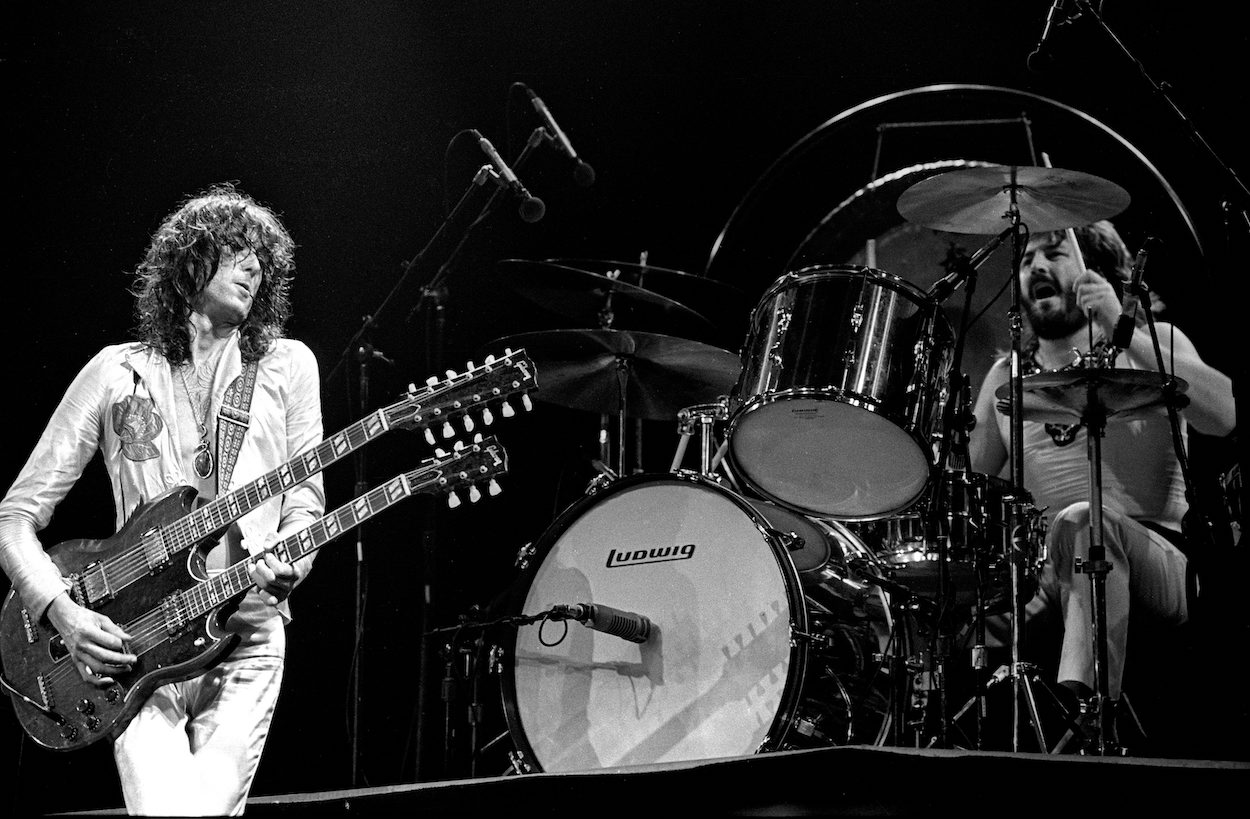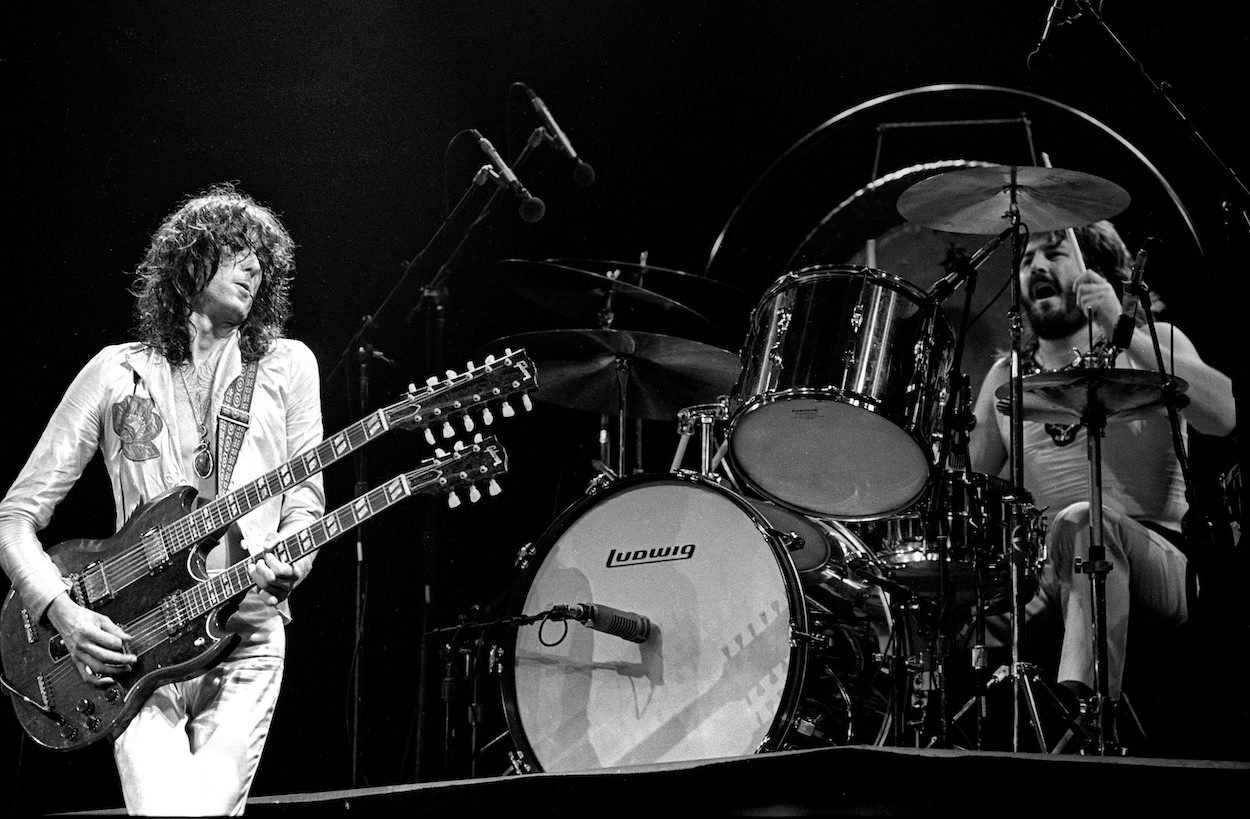
Jimmy Page Has Been Lying About How He Recorded the Drums on Led Zeppelin’s ‘When the Levee Breaks,’ and We Don’t Care
Jimmy Page became a guitar legend with Led Zeppelin, but his influence extended beyond his playing. He was against releasing singles (a decision reinforced when he heard a butchered version of a Zeppelin classic), and his prowess as a producer helped him lie to the record label when he produced Zep’s final album. It seems Page has been lying about how he recorded John Bonham’s drums on “When the Levee Breaks,” but we don’t care.

Jimmy Page has been lying about how he recorded John Bonham’s drums on ‘When the Levee Breaks’
One of Page’s unique recording techniques was to mic Bonham’s drums from above. That allowed the sound to expand before hitting the tape, which gave Bonzo’s powerful playing even more weight.
Legend holds that Bonham’s epic drum part on Led Zeppelin IV closer “When the Levee Breaks” came from recording them at a great distance. Mics two floors above and at the end of an adjacent long hallway produced a drum track that sounds massive and envelops the song.
Page has been lying about how he recorded the drums (or at least not telling the whole truth) for the song. As Grunge reports, Andy Johns, the recording engineer who worked on IV, revealed he achieved the drum sound with a combination of miking and an echo device called a Binson Echorec to produce a delay effect. That combination made Bonham’s drums sound larger than life. Music professional Rick Beato capably replicated Bonham’s “Levee” drum track by compressing and delaying the sound (via YouTube), just as Johns did.
Page has been lying/half-truthing how he produced Bonham’s drum sound on “When the Levee Breaks,” and we don’t care.
We don’t care that Jimmy Page has been lying about recording Bonzo’s drums on ‘When the Levee Breaks’
Most people don’t like being lied to, and we’re in the same boat. Still, we don’t care that Jimmy Page has been lying about John Bonham’s drum sound on “When the Levee Breaks.”
First, Page might be misinformed or assuming how Johns and Bonham record the track. Page might not have been there. As Beato describes, Johns asked Bonham to stay back and record when Page, Robert Plant, and John Paul Jones left. When he listened to the track later, Page might have thought Johns achieved the sound by mic placement only. He might not have known about the Binson Echorec.
Plus, what does it matter if Page keeps lying? Bonham plays an unforgettable drum part on “When the Levee Breaks” because of the whomp that comes from the delay effect. For the listener, it’s like seeing the sound wave break and then getting pummeled by the sonic boom moments later. It’s a stunning drum track that an atypical mic setup alone wouldn’t have achieved.
To cap it off, “When the Levee Breaks” showcases Led Zeppelin’s blues power in peak form. Bonham’s drums are too powerful to ignore, but his bandmates nearly rise to his level. Plant’s harmonica sounds like a full-speed freight train, and the song features one of his subtly powerful vocal deliveries. Page’s slide guitar work is some of his best. Jones’ bass playing, though overshadowed by the other three, holds down the rhythm and provides crucial melodies throughout the song. There’s a reason “When the Levee Breaks” remains one of the best Led Zeppelin songs.
We’ll forgive Page for lying about how Led Zeppelin achieved Bonham’s drum sound on “When the Levee Breaks.” The song is just too good to hold a grudge.
‘Led Zeppelin IV’ was a Bonham showcase
How good of a drummer was John Bonham? So good that he sits out two of the eight songs on Led Zeppelin IV and still leaves his mark. We already know “When the Levee Breaks” was a masterpiece, even if Page has been lying about the sound. Yet Bonham showcases his skills elsewhere.
He plays a deceptively simple beat on the chorus of “Black Dog” (listen for the tom and snare beats underneath the cymbal bell strikes). He struggled to nail his part on “Four Sticks,” but when he got it right (by using two sticks in each hand), Zeppelin named the song in his honor. Bonham plays like a tasmanian devil on “Rock and Roll,” and his fills at the climax of “Stairway to Heaven” contribute to the song’s epic feel.
Bonham was such an integral part of Led Zeppelin’s sound that Page said the band could never replace him after his death. “When the Levee Breaks” was one of Bonham’s greatest achievement, even if Jimmy Page has been lying about its making. (Just don’t do it again, James).
For more on the entertainment world and exclusive interviews, subscribe to Showbiz Cheat Sheet’s YouTube channel.


